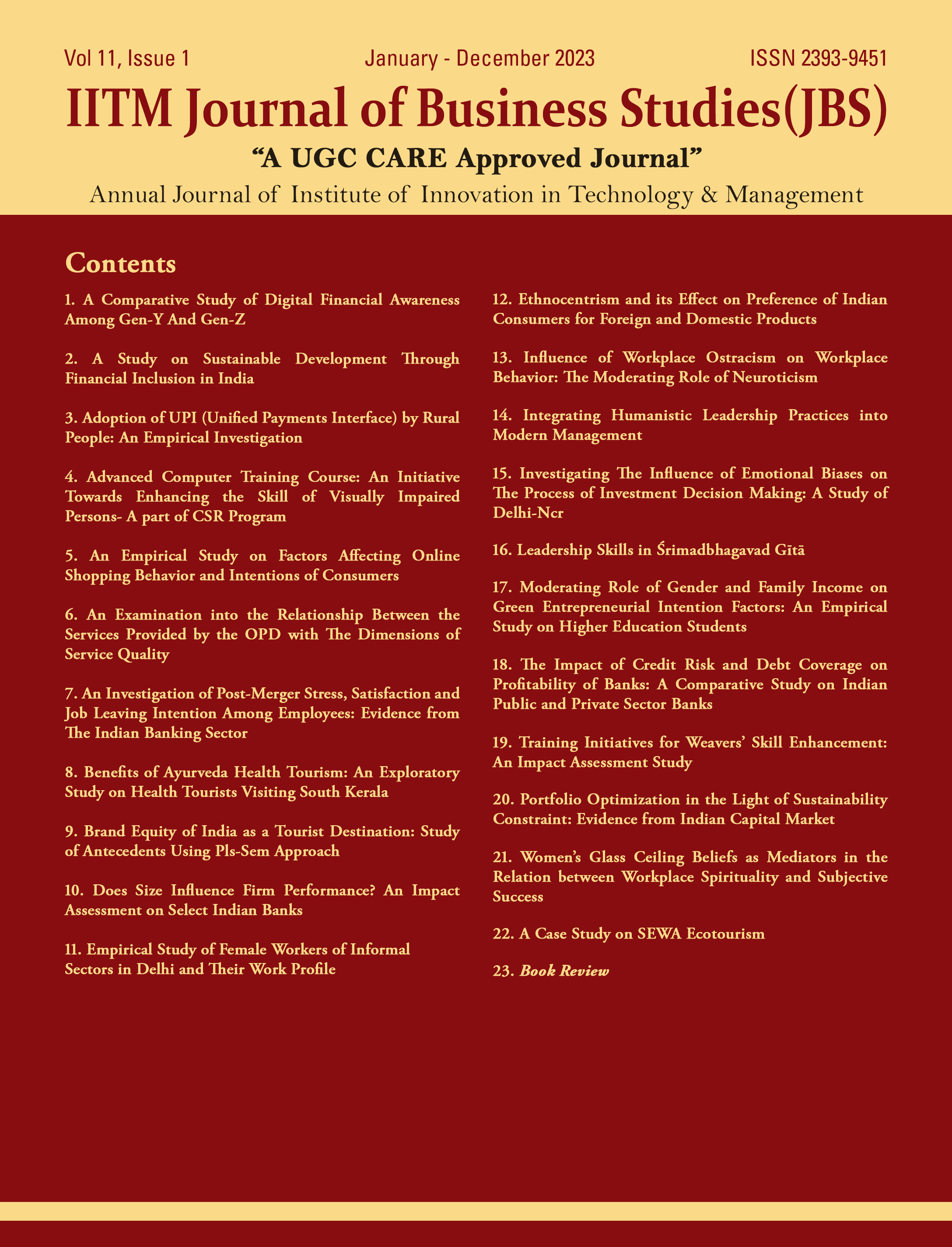Design Thinking & Virtual Management Training: A Systematic Literature Review
Keywords:
Design Thinking, Virtual, Management Training, Systematic Literature ReviewAbstract
Does the time of 21st century training necessitate exploration into emerging research pedagogies like design thinking for a better understanding of how design influences business and management? This review explains the changes in training perspectives within management settings using creative engagement methods like design thinking which call into question the future of dynamic business innovation. The paper undertakes a Systematic Literature Review of this nascent field, followed by a Bibliometric Analysis, Content Analysis to present a taxonomy of the field, and finally outlines interesting questions for future research to address.
References
Arnold, T. (2010). Integrative learning and the individualized prior learning assessment narrative. Journal of Continuing Higher Education, 58, 47-49.
Bennis, W. G., & O’Toole, J. (2005). How business schools lost their way. Harvard Business Review, 83(5), 96–104, 154.
Burdick, A., & Willis, H. (2011). Digital learning, digital scholarship and design thinking. Design Studies, 32(6), 546–556. https://doi.org/10.1016/j.destud.2011.07.005
Chambers, F. C. (2018). Learning to mentor in sports coaching: A design thinking approach. Abingdon on-Thames, England: Routledge.Cross, N. (2018). A brief history of the design thinking research symposium series. Design Studies, 57, 160–164.
Daniel, A. (2016). Fostering an entrepreneurial mindset by using a design thinking approach in entrepreneurship education. Industry and Higher Education, 30(3), 215–223. https://doi.org/10.1177/ 0950422216653195
Daniel, A., Costa, R., Pita, M., & Costa, C. (2017). Tourism education: What about entrepreneurial skills? Journal of Hospitality and Tourism Management, 30(1), 65–72. https://doi.org/10.1016/j. jhtm.2017.01.002
David, D., & Martin, R. (2006). Design thinking and how it will change management education: A overview and discussion. Academy of Management Learning & Education, 5(4), 512–523. 8. de Battisti, F., & Salini, S. (2013). Robust analysis of bibliometric data. Statistical Methods & Applications, 22(2), 269–283. https://doi.org/10.1007/s10260-012-0217-0
Doorley, S., & Witthoft, S. (2012). Make space: How to set the stage for creative collaboration. New York, NY: Wiley
Falagas, M. E., Pitsouni, E. I., Malietzis, G. A., & Pappas, G. (2008). Comparison of PubMed, Scopus, Web of Science, and Google Scholar: strengths and weaknesses. The FASEB Journal, 22(2), 338–342. https://doi.org/10.1096/fj.07-9492LSF
Foster, J., & Yaoyuneyong, G. (2016). Teaching innovation: Equipping students to overcome real-world challenges. Higher Education Pedagogies, 1(1), 42–56. https://doi.org/10.1080/23752696.2015. 1134195
Hedberg, P. R. (2009). Learning through reflective classroom practice. Journal of Management Education, 33, 10-36.
Henriksen, D., Richardson, C., & Mehta, R. (2017). Design thinking: A creative approach to educational problems of practice. Thinking Skills and Creativity, 26, 140–153. https://doi.org/10.1016/j.tsc. 2017.10.001
Huq, A., & Gilbert, D. (2017). All the world’s a stage: transforming entrepreneurship education through design thinking. Education and Training, 59(2), 155–170. https://doi.org/10.1108/ ET- 12-2015-0111 15. Kali, Y., Goodyear, P., & Markauskaite, L. (2011). Researching design practices and design cognition: Contexts, experiences and pedagogical knowledge-in-pieces. Learning, Media and Technology, 36(2), 129–149. https://doi.org/10.1080/17439884.2011.553621
Kevern, J. (2011). Green building and sustainable infrastructure: Sustainability education for civil engineers. Journal of Professional Issues in Engineering Education and Practice, 137(2), 1 17. Lee, H. (2019). Revitalising traditional street markets in rural korea: Design thinking and sense-making methodology. International Journal of Art and Design Education, 38(1), 256– 269. 18. Navarro, P. (2008). The MBA core curricula of top-ranked U.S. Business Schools: A study in failure? Academy of Management Learning & Education, 7(1), 108–123.
Neumeier, M. (2010). The designful company. In T. Lockwood (Ed.), Design thinking (pp. 15- 33). New York, NY: Allworth Press
Nielsen, S., & Stovang, P. (2015). DesUni: University entrepreneurship education through design thinking. Education and Training, 57(8–9), 977–991. https://doi.org/10.1108/ET-09- 2014-0121 21. Nisen, M. (2017). Do grades matter? Depends if you’re asking google or Goldman Sachs. Retrieved from https://qz.com/382570/goldman-sachs-actually-googlegpas-arent-worthless/ 22. Rivka, O. (2017). Thinking difference: Theories and models of parametric design thinking. Design Studies, 52, 4–39. https://doi.org/10.1016/j.destud.2017.06.001
Seidel, V., & Fixson, S. (2013). Adopting design thinking in novice multidisciplinary teams: The application and limits of design methods and reflexive practices. Journal of Product Innovation Management, 30(1), 19–33. https://doi.org/10.1111/jpim.12061
Sheehan, N., Gujarathi, M. R., Jones, J. C., & Phillips, F. (2018). Using Design Thinking to Write and Publish Novel Teaching Cases: Tips From Experienced Case Authors. Journal of Management Education, 42(1), 135–160. https://doi.org/10.1177/1052562917741179
Sleiman, T., Chung-Shin, Y., & Haddad, R. (2019). Empowering students in leading their education and practice: The design workbook.
Singh, V., & Gu, N. (2012). Towards an integrated generative design framework. Design Studies, 33(2), 185–207. https://doi.org/10.1016/j.destud.2011.06.001
van Eck, N. J., & Waltman, L. (2014). Visualizing Bibliometric Networks. In Measuring Scholarly Impact (pp. 285–320). Springer International Publishing. https://doi.org/10.1007/978-3-319-10377- 8_13
Williams, A. P. (2010). The history of UK business and management education. Bingley, UK: Emerald Group Publishing.
Zupic, I., & Čater, T. (2015). Bibliometric Methods in Management and Organization. Organizational Research Methods, 18(3), 429–472. https://doi.org/10.1177/1094428114562629
